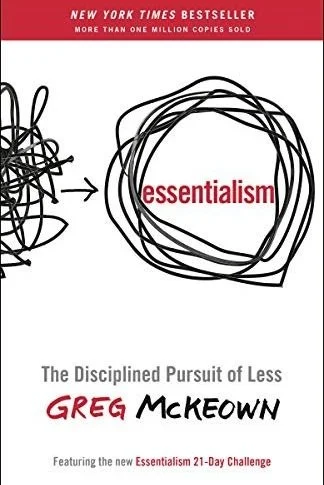Essentialism
By Greg McKeown
📚 The Book in 3 Bullets
Essentialism is about doing less but better.
Essentialism isn’t about how to get more things done; it’s about how to get the right things done.
Don’t be afraid of upsetting or disappointing someone for saying no. You can say no and regret it for a few minutes, or yes and regret it for weeks, months, or years. Protect the little time you have left on this planet.
🌎 How the Book Changed Me
This book showed me just how little time we have left in this life, and that we need to focus spending our time on what is truly essential and not the trivial BS we spend so much time worrying about.
✍️ My Top Quotes
If you don’t prioritize your life, someone else will.
You cannot overestimate the unimportance of practically everything. Few things are truly of importance.
Play doesn’t just help us to explore what is essential. It is essential in and of itself.
Half of the troubles of this life can be traced to saying yes too quickly and not saying no soon enough.
📖 Summary & Notes
Ask yourself “is this the most important thing I should be doing with my time and resources right now?” If the answer isn’t a definitive yes, then you shouldn’t be doing it.
Essentialism is about pausing and asking yourself if you’re investing in the right activities. There are far more activities and opportunities in the world than we have time and resources to invest in.
You need to learn how to sort out the minutiae from the few vital things we should focus on.
Constantly ask yourself, “what is the trade-off?”
Decision fatigue states that the more choices we have to make, the more the quality of those decisions deteriorates.
When cleaning out your closet, ask yourself “do I love this,” “do I look great in it,” and “do I wear this often.” If you have to ask yourself if there is a chance you will wear it someday in the future, then that item should be given away, otherwise, you’ll have a cluttered closet with clothes you barely wear.
Stop celebrating being busy as a measure of importance. Instead, celebrate the time we have to meditate, listen to podcasts or music, and enjoy our time with the most important people in our lives.
An essentialist thinks almost everything is nonessential.
Saying yes to any opportunity means you are saying no to several others.
We try and have it all, but everything has a trade-off. Do we want more pay or more vacation time? Ask yourself which problems you want.
The way of the essentialist is to explore and evaluate a broad set of options before committing to any.
You need to carve out space and time to escape and explore life.
Nobody likes to be bored, but by getting rid of all boredom, we lose our time to think and process.
Set aside time in the mornings to read before checking your phone to center yourself before starting the day.
Find activities that you enjoy just for the joy of doing rather than as a means to an end—whether it’s reading, playing catch, doing puzzles, or listening to music.
Stress shuts down creativity and productivity. Make sure to set aside time for play to cut down stress.
Our ability to prioritize comes from protecting our sleep at all costs.
Be highly selective. Ask yourself “is this exactly what I’m looking for?”
If we just say yes because it is an easy reward, we run the risk of having to later say no to a more meaningful one.
Stop spending energy on trying to look good in comparison to other people. Don’t overvalue nonessentials like a nicer car or house or followers on Instagram. Focus on things that truly matter and are essential like time spent with loved ones, things we’re passionate about, and taking care of our health.
Become good at gracefully saying no like:
I am flattered but I’m afraid I don’t have the bandwidth to commit to this
I will check my calendar and get back to you
A soft “no” or “no but”
I can’t do it, but X might be interested
The more you think about what you’re giving up by saying yes, the easier it is to say no.
Make peace by the fact that saying no requires trading in popularity for respect.
A clear no can be more graceful than a noncommittal yes.
We need to learn the slow “yes,” and the quick no.
Have the courage to say I shouldn’t have pursued this direction in the first place and uncommit, no matter the sunk costs.
We tend to undervalue things that aren’t ours and overvalue things because we already own them.
We should ask ourselves if I didn’t own this, how much would I be willing to spend to obtain it?
Don’t be ashamed of making mistakes, after all, we really are only admitting that we are now wiser than we once were.
Set clear boundaries so you are free to select from a whole range of options.
Practice extreme and early preparation. Create a buffer to prepare for unforeseen things that will inevitably come up.
Stop underestimating how long a task will take, add 50 percent more time than you think it’ll take to complete a task.
Don’t think something needs to be perfect, instead think “done is better than perfect.”
We can multitask, but we can’t multi-focus. We need to have one sole focus when working on something and then move on to the next thing on the list.
Ask yourself what is most important to do right now. Then eliminate everything else that isn’t that to do later.
An essentialist doesn’t try to efficiently cross off everything on his to-do list, instead, he changes what he puts on there in the first place.
